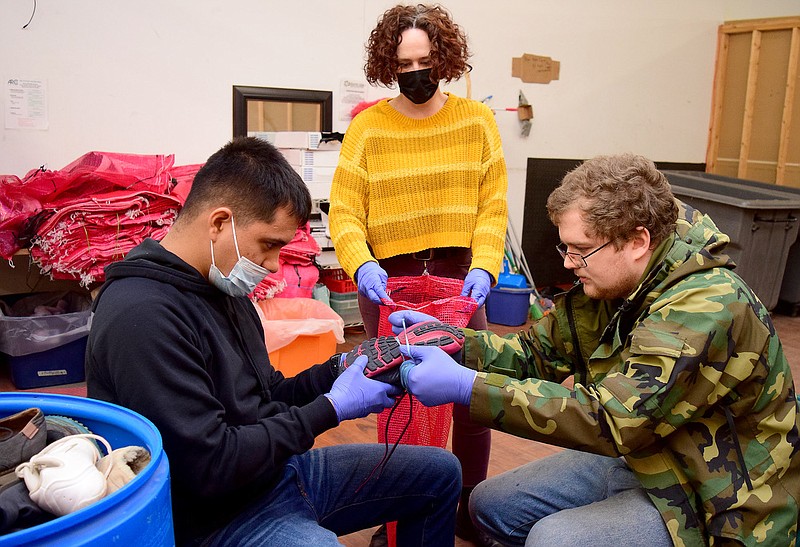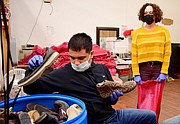As it begins to celebrate its 100th anniversary, the United Way of Greater Chattanooga has redesigned how the nonprofit determines where to invest its money in what leaders say is an effort to keep up with rapidly changing community needs and evolving donor demands.
United Way is shifting to a competitive, application-based approach to determine where to issue grants in the new year as opposed to automatically funding the same 40 traditional partners.
Now, grant applications through the United Way are open to any 501(c)(3) nonprofit organization within the agency's six-county footprint, which includes Hamilton, Marion and Sequatchie counties in Southeast Tennessee and Dade, Walker and Catoosa counties in North Georgia.
Local volunteer advocates will score the applications, and then a volunteer committee familiar with the community's needs will choose which agencies receive funds in May. Agencies are then expected to use a data-driven approach to track whether the investments are improving outcomes, and applications must be re-submitted annually.
Letters of intent for interested grant applicants are due Friday, and volunteer advocate applications are due Feb. 11.
Abby Garrison, vice president of community investments at the United Way of Greater Chattanooga, said the organization's mission to build a connected community - granting funds to organizations focused on improving education, health, well-being and stability - remains unchanged.
Garrison said the traditional partners still do great work, but the shift is "trying to make space for new organizations who are also doing great, important work that our model wasn't set up to support."
Although some applicants will lose out on funds, she said leadership believes this process is more inclusive.
Many other United Ways across the country, which are all independent, have switched to similar "community impact" models in recent years.
The United Way of Greater Chattanooga investment strategy overhaul began more than five years ago, starting with brainstorming how to transition to a model that better addresses systemic issues, such as generational poverty and health disparities.
Corporate campaigns are United Way's biggest funding stream, and Garrison said businesses nowadays want to see a "return on investment" when it comes to their charitable giving.
Because the partner agencies rely on United Way grants to operate, Garrison said they were involved in the process and given three years to phase out of the old model. Each year, organizations could opt into the new competitive pool or take a guaranteed amount of funds, but the grants grew smaller each year.
"For a couple of these agencies - some of the smaller ones - we're almost 50% of their funding, so we did not want to just rip the Band-Aid off and throw them into a competitive, open marketplace. We very much wanted to come along with them and have them help us envision this," Garrison said.
At the same time, some partners don't need the same level of assistance now that federal COVID-19 relief funds are available.
"Child care centers have historically been a huge piece of the pie for us, but all of a sudden they've actually got a lot of different funding sources on the table," she said.
United Way also added two "sub-applications" - one for innovation and one for capacity building - to encourage agencies to try new ideas that are typically hard to secure funding for, because they're trying something unproven and therefore potentially riskier.
Northside Neighborhood House is a community partner that received one of the new innovation grants, allowing the nonprofit to change the business model at its thrift stores.
Rachel Gammon, CEO at Northside Neighborhood House, said the group relies on revenue from its three thrift stores to fund its programming that includes tutoring for elementary, middle and high school students, as well as basic education for adults, and financial assistance for utilities, prescriptions and food to residents north of the Tennessee River in Chattanooga.
Traditionally, Northside Neighborhood House only had enough staff to operate its thrift stores Monday through Friday. But the innovation grant allowed the group to add two new staff positions, enabling the stores to also open on Saturday. As a result, Northside increased revenue enough to fund those positions internally for the long term.
"Having the support of the United Way to think outside of the box around that and not be limited and strained made us able to grow and add those positions," Gammon said. "And that created more revenue and therefore allowed us to serve people more effectively in our community."
Although the investment overhaul was already underway, Garrison said the pandemic further highlighted the nonprofit sectors' need to become more nimble in the modern era.
"No one knew COVID was coming when this journey started, but I think that having started this journey of transition was really fortuitous," she said. "It has set us up so that when things change, when big things happen, we can change along with it."
Contact Elizabeth Fite at efite@timesfreepress.com or follow her on Twitter @ecfite.

